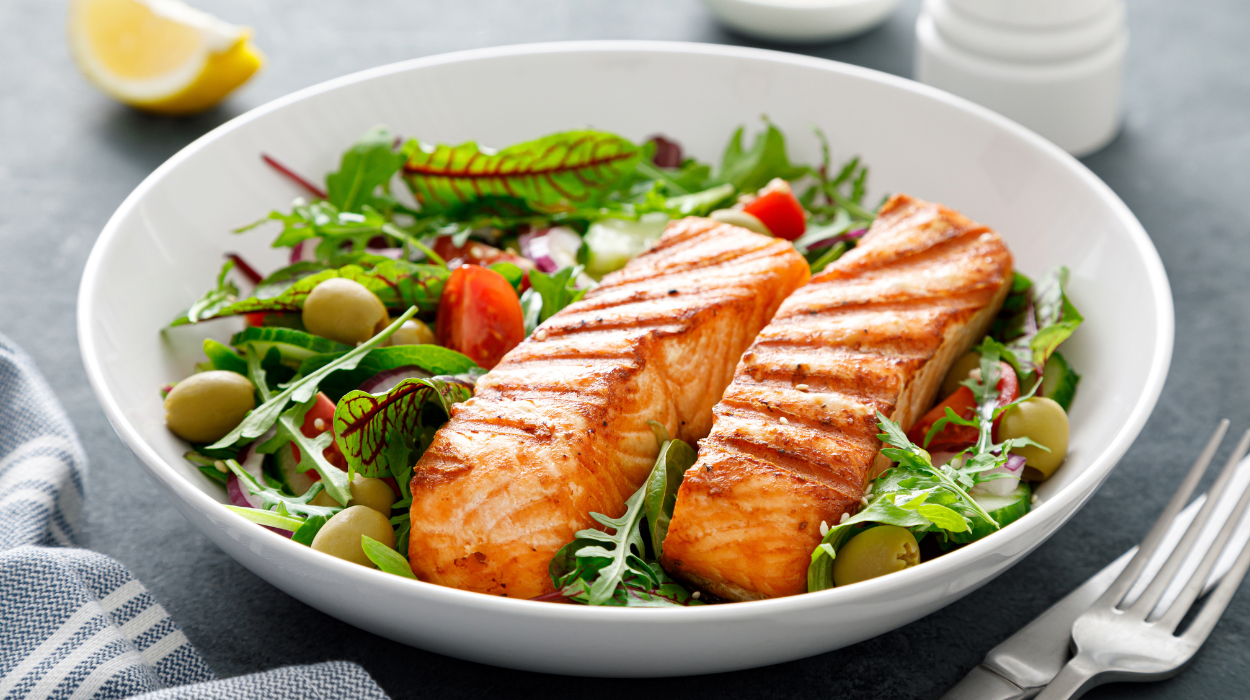Are you looking for a delicious and nutritious addition to your weight loss journey? Look no further than salmon. This popular fish has long been praised for its health benefits, but does it support weight loss? Today we will share the link between salmon and weight loss, discover its nutritional information, and some mouthwatering recipes to help you incorporate it into your diet.

Contents
- 1 Is Salmon Good For Weight Loss?
- 1.1 1. Rich in Omega-3 Fatty Acids
- 1.2 2. Great Source of Protein
- 1.3 3. High in B Vitamins
- 1.4 4. Good Source of Potassium
- 1.5 5. Loaded with Selenium
- 1.6 6. Contains Astaxanthin
- 1.7 7. May Reduce the Risk of Heart Disease
- 1.8 8. May Benefit Weight Management
- 1.9 9. Can Help Prevent Inflammation
- 1.10 10. May Protect Brain Health
- 1.11 11. Can Improve Mental Health
- 1.12 12. May Help Maintain Healthy Vision
- 1.13 13. Could Support Bone Health
- 1.14 14. Delicious and Versatile
- 2 Which Salmon Is Best To Buy?
- 3 FAQs:
Is Salmon Good For Weight Loss?
Salmon is indeed a great choice for weight loss due to its numerous health benefits and nutritional content. Let’s take a closer look at why salmon can be a valuable addition to your weight loss journey:
1. Rich in Omega-3 Fatty Acids
Salmon is packed with omega-3 fatty acids, which have been shown to reduce inflammation in the body and support overall well-being. These essential fats can potentially alleviate symptoms of inflammatory conditions such as arthritis, obesity, and heart disease.
2. Great Source of Protein
Protein is a crucial component of any weight loss plan, as it helps you feel fuller for longer and aids in building lean muscle. Salmon is an excellent source of high-quality protein, making it an ideal choice for those looking to shed pounds while maintaining muscle mass.
3. High in B Vitamins
Salmon is rich in B vitamins such as B6 and B12, which play a vital role in metabolism and energy production. These vitamins help your body convert food into fuel, supporting your weight loss efforts.
4. Good Source of Potassium
Potassium is an essential mineral that helps regulate fluid balance, nerve function, and muscle contractions. Consuming foods like salmon, which are high in potassium, can help maintain healthy blood pressure levels and support your overall health.
5. Loaded with Selenium
Salmon is a great source of selenium, a powerful antioxidant that plays a crucial role in protecting your cells from damage. Additionally, selenium supports thyroid function, which can impact your metabolism and weight management.
6. Contains Astaxanthin
Astaxanthin, an antioxidant found in salmon, has been linked to improved eye health and a reduced risk of age-related visual decline. By incorporating salmon into your diet, you can potentially support your eye health while working towards your weight loss goals.

7. May Reduce the Risk of Heart Disease
The omega-3 fatty acids in salmon have been extensively studied for their heart-healthy benefits. Regular consumption of salmon can help reduce inflammation, lower blood pressure, and decrease the risk of heart disease.
8. May Benefit Weight Management
Thanks to its high protein content and low calorie count, salmon can be a beneficial addition to your weight loss diet. Protein promotes feelings of fullness, curbing cravings and reducing the urge to snack between meals.
9. Can Help Prevent Inflammation
Salmon’s omega-3 fatty acids have anti-inflammatory properties that can potentially reduce inflammation and pain in the body. By including salmon in your diet, you may experience a positive impact on conditions related to inflammation, such as rheumatoid arthritis and heart disease.
10. May Protect Brain Health
The omega-3 fatty acids found in salmon have been linked to improved brain function and reduced risk of cognitive decline. Regular consumption of salmon may support memory, learning, and overall brain health.
11. Can Improve Mental Health
Research suggests that consuming omega-3 fatty acids from sources like salmon may have a positive impact on mental well-being. These healthy fats may help alleviate symptoms of depression and enhance overall mood.
12. May Help Maintain Healthy Vision
Salmon’s rich content of omega-3 fatty acids, particularly DHA, is beneficial for eye health. Regular consumption of salmon may reduce the risk of age-related visual decline and promote overall eye health.
13. Could Support Bone Health
Salmon is high in vitamin D, a nutrient that is essential for strong bones. Including salmon in your diet can help ensure adequate vitamin D intake and potentially reduce the risk of osteoporosis.
14. Delicious and Versatile
Not only is salmon incredibly nutritious, but it’s also delicious and versatile. You can enjoy salmon grilled, baked, broiled, or even added to salads, stir-fries, or wraps. Its versatility allows you to incorporate salmon into a variety of dishes, making it a satisfying and tasty addition to your weight loss diet.
Which Salmon Is Best To Buy?
Here are a few factors to consider when buying salmon:

1. Wild-caught Salmon
Opt for wild-caught salmon whenever possible. This type of salmon is known to be leaner and have a more intense flavor compared to farm-raised salmon. Wild-caught salmon also contains higher levels of omega-3 fatty acids, which can aid in weight loss and overall health.
2. Fresh or Frozen
Both fresh and frozen salmon can be good options, but each has its own advantages. Fresh salmon is great if you plan to cook it right away and enjoy its firm texture. On the other hand, frozen salmon is convenient to have on hand for meal prepping and can often be more economical. Just make sure to thaw it properly before cooking.
3. Sustainable Sourcing
Consider choosing salmon that is sustainably sourced. Look for certifications such as the Marine Stewardship Council (MSC) or the Aquaculture Stewardship Council (ASC) to ensure that the salmon you purchase is caught or farmed in an environmentally friendly and responsible manner.
4. Varieties of Salmon
There are different varieties of salmon available, such as Chinook (King), Coho (Silver), Sockeye (Red), and Atlantic. Each variety has its own distinct flavor and texture. Experiment with different types of salmon to find the one that you enjoy the most.
FAQs:
Can eating salmon help with weight loss?
Yes, salmon can aid in weight loss. It is low in calories and high in protein, which helps increase satiety and promote lean muscle mass. The presence of omega-3 fatty acids in salmon also helps regulate metabolism and reduce inflammation, contributing to weight management.
What kind of salmon is best for weight loss?
Wild-caught salmon is recommended for weight loss because it is leaner and contains higher levels of omega-3 fatty acids. It is important to choose salmon that has been sustainably sourced and avoid farmed salmon, which may have higher levels of contaminants and artificial additives.
Is fresh or frozen salmon better for weight loss?
Both fresh and frozen salmon can be equally beneficial for weight loss. Fresh salmon is preferred for its taste and texture, but frozen salmon retains its nutritional value and can be more convenient and cost-effective. Look for flash-frozen salmon to preserve its freshness and nutrients.

Hello, I’m Ravindra. Over the years, I’ve immersed myself deeply into the world of fitness and health, transforming both my body and mind. Writing has allowed me to share my journey, insights, and expertise with those just starting out and seasoned fitness enthusiasts alike. Beyond just routines and diets, I believe in inspiring others to adopt a holistic approach to well-being.
